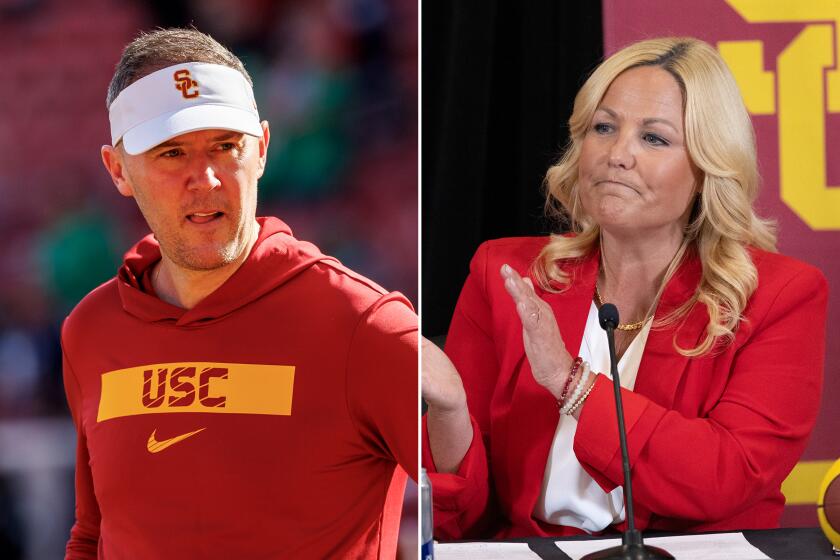Cycling event steps up testing
- Share via
The Amgen Tour of California cycling race, which begins Feb. 17 in Palo Alto and ends Feb. 24 in Pasadena, will carry out doping controls more stringent than those used at the Tour de France last summer.
Cycling is struggling to recover from a two-year series of doping scandals that included 2006 Tour de France winner Floyd Landis having his title vacated after a failed drug test and having the leader and almost certain winner of the 2007 Tour de France, Michael Rasmussen, ejected from the race four days before its completion for alleged doping violations.
Officials from USA Cycling, AEG Sports, which is presenter of the Tour of California, drug-testing officials and a team director presented a united front Tuesday at the ADT Center in Carson while announcing new efforts to clean up the sport.
According to Andrew Messick, president of AEG Sports, all riders will have blood samples collected before the Tour of California begins.
The results will be part of the International Cycling Union’s (UCI) new “biological passport” program, which is intended to be an electronic record for each cyclist. This “passport” will contain an accounting of base blood levels and ideally will indicate even a small change in an athlete’s indicators for banned substances.
Also, Messick said, any rider that has an open doping investigation according to UCI will not be allowed to start. Messick said each of the 17 teams entered in the California race must submit a roster of 12 potential riders by the end of this week.
Besides the blood sampling, 30% of riders will have urine samples taken before the race. Blood samples will be tested for signs of blood doping. Urine samples will be analyzed for evidence of banned substances, such as steroids, the blood-doping agent erythropoietin (EPO) and masking agents.
Each stage winner during the Tour of California plus the overall leader each day and three randomly selected riders will have a full drug screening for steroids, EPO and masking agents. In addition, there will be random morning and evening testing for three additional riders each day.
Bob Stapleton is owner of Team High Road, which was formerly the German-based T-Mobile team that lost its sponsorship after revelations of rampant doping on the team were publicized last year. Stapleton, an American, is funding the team this season because he believes the sport can be cleaned up.
Stapleton, whose best-known rider this year will be former Lance Armstrong teammate George Hincapie, says he hopes that the more comprehensive testing procedures prove that cycling is changing.
“We want to be an example to sports overall in terms of acting together to make change,” Stapleton said. “Governing bodies, sponsors, race organizers, teams and athletes all have to be committed to clean and fair sports.”
Messick also said part of the blood taken for screening will be put aside for the time when the World Anti-Doping Agency (WADA) has a reliable test for human growth hormone (HGH).
USA Cycling’s Johnson said the hope is that the risks for riders of failing these more comprehensive and frequent tests will be more than the rewards of winning while doping.
“This is a higher bar of testing than is typical at any race,” Johnson said. “The screening, the use of the biological passport, the automatic screening for EPO, that is the highest standard of testing.”
AEG spokesman Michael Roth said that the extra drug screening will cost “in excess of $100,000,” and that the cost is being picked up by AEG.
If a rider who is entered in the race is found to have an open doping investigation according to the UCI or fails the pre-race blood and urine screening, he will not be allowed to start, but his name will not be released.
“The unfortunate truth,” Messick said, “is that you can’t talk about elite cycling today without addressing the recent incidents about performance-enhancing substances.
“We all wish this weren’t necessary. But we’ve spoken repeatedly and at great depth with corporate sponsors. We have been told this is needed and we understand this program is the most comprehensive in cycling history.”
--
More to Read
Go beyond the scoreboard
Get the latest on L.A.'s teams in the daily Sports Report newsletter.
You may occasionally receive promotional content from the Los Angeles Times.









